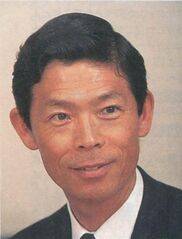Difference between revisions of "Tomoji Miyamoto"
From Sega Retro
m (Text replacement - "= | company=Sega of Japan |" to "= | employment={{Employment | company=Sega of Japan }} |") |
|||
| Line 6: | Line 6: | ||
| employment={{Employment | | employment={{Employment | ||
| company=[[Sega of Japan]] | | company=[[Sega of Japan]] | ||
| + | | divisions=[[Sega AM4]]{{magref|ssmjp|1996-09|143}}, [[Sega AM6]]{{magref|segamagjp|7|16}}, [[Sega Mechatro]]{{magref|dmjp|1999-36|15}} | ||
| + | | start=1966{{magref|ssmjp|1996-09|143}} | ||
}} | }} | ||
| role=Designer, Director, Engineer | | role=Designer, Director, Engineer | ||
Latest revision as of 16:45, 26 July 2022

|
| Tomoji Miyamoto |
|---|
| Date of birth: 1945-08-16[1] (age 79) |
| Employment history: Sega of Japan (1966[1] – )
Divisions:
|
| Role(s): Designer, Director, Engineer |
This teeny-tiny article needs some work. You can help us by expanding it.
Tomoji Miyamoto (宮本 智司) is a Japanese engineer, designer, and director.[4] Born in August 1945, he joined Sega during 1966,[1] and was initially among the early recruits for production of slot machines at the Sega Production and Engineering Department.[4] He went on to lead design of the first UFO Catcher crane game in the 80s, as well as subsequent iterations.[1]
Unusually for the time, Miyamoto remained in the company long enough to see the creation of the "AM" R&D teams, inevitably becoming a senior member at AM4 in the early 90s.[1] Some point after late 1996,[4] he moved to be director of AM6, specializing in medal games.[2]
When AM4 and 6 merged in 1999 to become Mechatro, they emerged with Miyamoto as the division's head figure;[3] superseded in the early 2000s by Masao Yoshimoto.[5]
He can be seen pictured on the promotional flyer for Harness Race.[6]
Production history
- Aqua Stage (H1 Board; 1995) — Producer
- Samba de Amigo (NAOMI; 1999) — Project Manager
Magazine articles
- Main article: Tomoji Miyamoto/Magazine articles.
External links
- Astamuse patent filings (archived)
References
- ↑ 1.0 1.1 1.2 1.3 1.4 1.5 Sega Saturn Magazine, "1996-09 (1996-06-14)" (JP; 1996-05-24), page 143
- ↑ 2.0 2.1 Sega Magazine, "1997-05 (1997-05, 06)" (JP; 1997-04-11), page 16
- ↑ 3.0 3.1 Dreamcast Magazine, "1999-36 (1999-11-19,26)" (JP; 1999-11-05), page 15
- ↑ 4.0 4.1 4.2 Game Hihyou, "December 1996" (JP; 1996-11-30), page 23
- ↑ Sega Arcade History, Enterbrain, page 180
- ↑ Sega Magazine, "1997-05 (1997-05, 06)" (JP; 1997-04-11), page 17